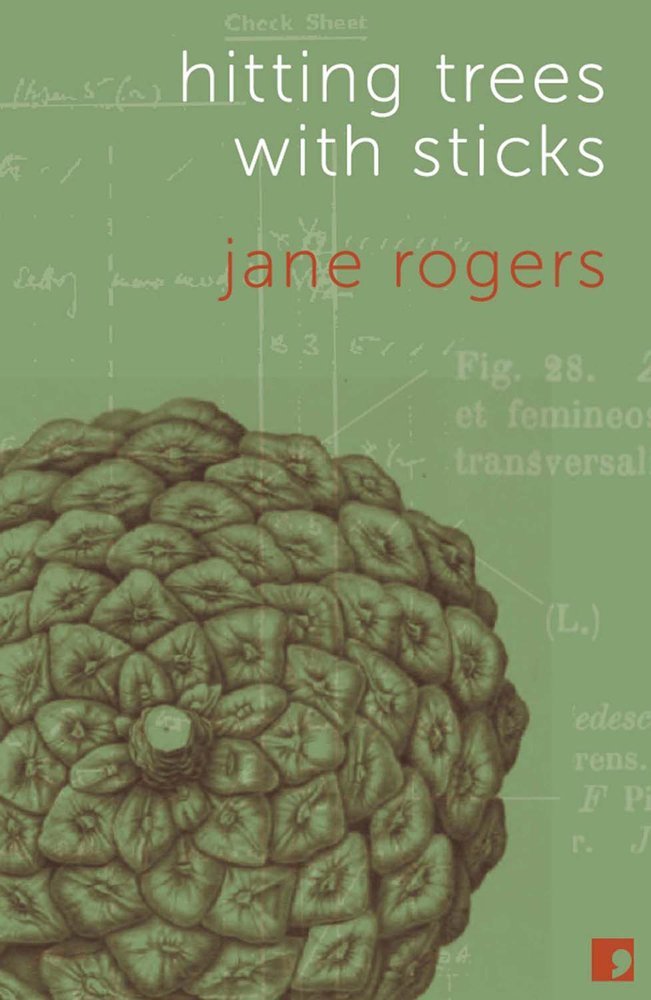
photo by Alfred Borchard
by Carlotta Eden
Like many writers, Jane Rogers seems to have occupied a literary comfort zone, not straying too far from the novel, and winning nominations and awards for these longer works, such as an Orange Prize longlisting for Island and The 2012 Arthur C. Clarke Award for The Testament of Jessie Lamb. But her most recent book is a debut short story collection, Hitting Trees with Sticks, the title story of which was shortlisted for the BBC National Short Story Award. I wanted to know more.
 I opened the collection (its cover intriguingly sprinkled with scientific equations and… an artichoke? No, a fir cone, it’s definitely a fir cone) and began to read the first story, ‘Red Enters the Eye’. Set in Nigeria, ‘Red Enters the Eye’ follows dressmaker Julie as she journeys to a women’s refuge to teach sewing. It’s as challenging a subject as you might expect, and as I read, I thought I knew the story’s direction. But Rogers’ use of colour creates an undercurrent of threat, one that takes the story off in a different, unpredictable direction. Julie falls for the ‘reds and purples of hibiscus’; the women choose ‘red flowered’ fabric to make bedspreads, and Julie believes that ‘With a small injection of capital’, the women could make ‘a range of these eye-catching fabrics’. The images of red echo the story’s title and allude to the ultimate consequences of Julie’s actions. Nothing is what it seems to be.
I opened the collection (its cover intriguingly sprinkled with scientific equations and… an artichoke? No, a fir cone, it’s definitely a fir cone) and began to read the first story, ‘Red Enters the Eye’. Set in Nigeria, ‘Red Enters the Eye’ follows dressmaker Julie as she journeys to a women’s refuge to teach sewing. It’s as challenging a subject as you might expect, and as I read, I thought I knew the story’s direction. But Rogers’ use of colour creates an undercurrent of threat, one that takes the story off in a different, unpredictable direction. Julie falls for the ‘reds and purples of hibiscus’; the women choose ‘red flowered’ fabric to make bedspreads, and Julie believes that ‘With a small injection of capital’, the women could make ‘a range of these eye-catching fabrics’. The images of red echo the story’s title and allude to the ultimate consequences of Julie’s actions. Nothing is what it seems to be.
In ‘Conception’, a young girl asks her mother how she was conceived. Again, nothing is what it seems. This is, of course, a relatively awkward conversation, but particularly so for this mother, who is now divorced from the girl’s father. The rushed, ill-thought conception occurred in a holiday cottage that was filled with the messy remnants of its previous occupants’ broken marriage:
The flavour of that house returned to haunt me in the dark days of our break-up. The beds strewn with clothes; the disconsolate dog; the dementedly whirring hamster.
However, the mother knows that some things are better left unsaid, and so she paints a picture of a cottage ‘full of life’, just to see the happy, flushed expression on her daughter’s face. A fresh, naive anxiety permeates ‘Conception’. Rogers exposes that which lies below the surface and digs deeper still:
Mostly I think we were just young and shiny and invulnerable. But on bad days I see the whole thing as fraudulent: we didn’t plan a future, we didn’t even dare discuss our motives. We used Hillcrest Cottage to make ourselves feel better, revelling in our superiority to the cluttered, broken household where we found ourselves.
Each word in Rogers’ collection is a driving force towards an unpredictable ending. ‘Morphogenesis’ is an example of Rogers at her best. She evokes for us the life of Alan Turing, one of the founding fathers of computer science, as he grows from a small boy into a man whose private life and homosexuality have been spotlighted by Her Majesty’s Government. The story is strikingly different from the others; there’s a marked tonal shift that recreates a sense of an almost filmic montage. The story unfolds in a high-energy, free-flowing form of prose that captures both the intensity of thought of a leading mind and the complexities of an unconventional life.
Chris is here; Alan’s brain reports that as objectively as it notes the sharp brilliance of the stars and their patterns on his knees through his old pyjamas. It is fact enough […] for it to drive him, in a few weeks’ time, to a written explanation.
Amidst the hot, grassy summer in the opening of ‘Morphogenesis’, a small boy finds the perfect spot to release himself as ‘his bladder gives a plaintive twinge’. Dutifully, ‘he aims at the base of the corner post, drilling a hole in the dust with his pee, splashing darkly up the wood’. Never before have I found the image of someone urinating to be so vividly, and even poetically, rendered:
The hot ammonia smell rises intensely for a moment then mingles with the heather and dust, dilutes, diffuses, fades into the summer air. When the pee has evaporated, it will leave that little ridged circle in the dust which it has turned to med. Like a volcano crater.
The narration is sharpened by our knowledge that this boy will grow up to be a scientist; the specificity of observation – revealed by words like ‘ammonia’, ‘dilutes’, ‘diffuses’ and ‘evaporated’ – are more important to the story than the act itself. Here is a writer who can seemingly inhabit the point of view and world of any character.
In ‘Saved’, we’re introduced to Alice who has recently broken up with her boyfriend and whose grandmother has died. Alice needs a trailer – which is loaded with rotting apples – to take her grandmother’s bed away. The rotting apples act as  a constant, sticky presence; a residue that seeps through the story and Alice’s thoughts. As she attempts to save the apples, deciding to use them for cooking, she imagines ‘slicing Vince out of her system like this, like a surgeon removing a tumour’. Such bodily, visceral images make Rogers’ writing and her characters strikingly human.
a constant, sticky presence; a residue that seeps through the story and Alice’s thoughts. As she attempts to save the apples, deciding to use them for cooking, she imagines ‘slicing Vince out of her system like this, like a surgeon removing a tumour’. Such bodily, visceral images make Rogers’ writing and her characters strikingly human.
The title story, ‘Hitting Trees with Sticks’, is as poignant as it is sharp. It propels the reader into the story of an elderly woman who is suffering from dementia. Rogers handles this with deft precision and sensitivity, but it’s all the more unsettling because of that. Metaphoric language speaks more powerfully of the woman’s day-to-day experience than the facts of her condition. We see that, while dementia might steal one’s memory, life itself can remain undimmed. Indeed the emotional life might be heightened in crisis, and therein lies the tragedy for Rogers’ character: ‘That flicker of indignant fury runs through my veins like a shot of cognac.’
Great short stories linger in the minds of readers like old photographs. That’s the mark of a powerful story – to come away from the narrative with a vivid, living picture, its images playing like a montage in the mind. Hitting Trees with Sticks is unequivocally alive with such stories.


One thought on “Hitting Trees with Sticks”
Comments are closed.